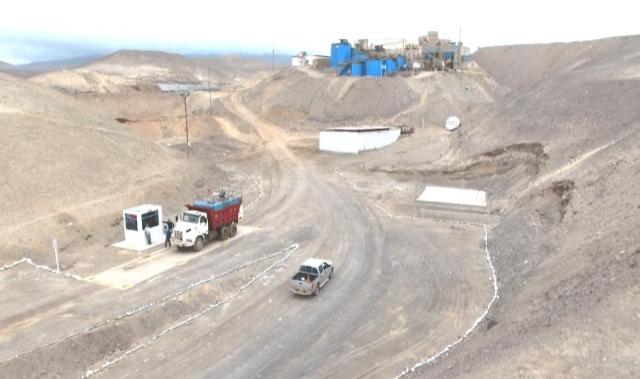Peru is the 6th largest gold producer on the planet. There are a few monster mines like Newmont’s (NEM.NYSE) Yanacocha mine. But it is estimated there are also 200,000 small-scale miners in Peru, extracting over $2 billion worth of gold billion annually.

Traditionally the small-scale miners pay no taxes or sales duty – and generate no income for the government. Eighty percent of them use mercury to extract the gold from the ore. Millions of gallons of mercury waste gets dumped into Peruvian rivers, killing fish and causing wide-spread health problems.
No surprise – five years ago the central government in Peru decided to “formalise” (regulate and tax) the small-scale miners. About 70,000 small-scale miners enrolled in initial Formalization Process. Another 60,000 miners are expected to join.
Miners who didn’t enroll have had their operations shut down by the Peruvian army.
The “formalised” miners must adhere to environmental regulations, pay taxes and get their ore processed at government sanctioned milling operation.
No more dumping mercury in the rivers or humping sacks of gold over the mountains to Bolivia.
The formalisation process has created a demand for government-permitted milling facilities to process the ore.
This sea-change in Peru’s gold mining landscape is a business opportunity for Inca One (IO.V) a Canadian-based company operating a 100 tonne/day gold milling facility in southern Peru.
IO does not do the things that traditional gold juniors do – like running airborne seismic surveys or drill programs.
It is an industrial manufacturing company, turning ore into bullion.

Granted – the mill (pictured left) is never going to be a popular bird-watching destination or even pleasant spot for a tailgate party. But it is an environmentally friendly gold factory that is ramping up cash flow.
If you look at the data below, the only thing NOT increasing is the “average grade of gold” which fell 17.4% to .05 ounces/tonne. That’s 14 grams of gold per tonne – about 700% higher than Barrick’s (ABX.NYSE) average reserve grade.
Small-scale miners target higher grades than large open pit mines. The Mom & Pop miners tend to focus on long narrow veins of gold. In fact, they consider anything under 5 grams of gold per tonne to be waste rock. It’s simply not worth the cost to dig it, blast it, transport it and process it.
Consequently, Inca One mill only high-grade rock. The modest scale-of-operation creates a chain of efficiency.
Inca One’s business model is not easy to duplicate – because it involves a matrix of relationships with miners, metallurgists, truckers, chemical companies – and most importantly: government agencies.
With no hard extraction costs, Inca One’s bottom line is disconnected from the price of gold. No – “disconnected” is an overstatement.
With gold at $1,200 an ounce, Inca One keeps about $400. If gold falls to $900, it keeps $325. If gold goes to $2,000 Inca One will keep about $700 per ounce.
A high gold price is better, but low gold is not a company killer.
Here are the numbers from their Q3 2017 Operational Highlights
- Mineral purchases were 6,459 tonnes in Q3 2017 as compared with 3,522 tonnes in Q3 2016, an increase of 83%.
- Mineral processed was 7,298 tonnes in Q3 2017 as compared with 3,853 tonnes in Q3 2016, an increase of 89%, including an all-time company high of 2,985 tonnes in December 2016.
- Average grade of gold processed was 0.50 ounces/tonne in Q3 2017 as compared to 0.60 ounces/tonne in Q3 2016, a decrease of 17.4%.
- Gold production was 3,149 ounces in Q3 2017, compared with 2,015 ounces in Q3 2016, an increase of 56%.
- Sales of approximately $5.1 million were achieved in Q3 2017, compared with $3.1 million in the same quarter in Q3 2016, an increase of 63%.
- Daily throughput averaged 79.3 tonnes per day (“TPD”) in Q3 2017, as compared to 45.1 TPD in Q3 2016, an increase of 76%.
- In December 2016, the Chala Plant operated successfully in excess of 100 TPD for approximately 20 days including throughput up to 130 TPD (to compensate for lower production days, as applicable).
- As at January 31, 2017, there were approximately 181 ounces of finished goods gold inventory, 180 ounces of gold in process inventory, and 165 ounces of gold in 230 tonnes of stockpiled material.
That’s a solid report card! In the current gold environment, gold sales are increasing.
If you’re wondering why Inca One is not an investor darling, there is a very simple answer: IO is not yet turning a profit.
During Q3 2017, the Company incurred a net loss of $2.2 million. Along with a gross operating deficit (-$537,948), there was a net restructuring loss (-$524,490), management fees and salaries (-$373,939) office stuff (-$171,596) and finance costs -($293,735).
“2016 was a highly transitional year for Inca One,” stated Inca One CFO, Oliver Foeste, “With the comprehensive balance sheet Restructuring and refinancing. The benefits of the Restructuring were not fully realized by the Company during Q3 2017 as the Company incurred many ramp-up costs while production levels were gradually increasing.”
The key question for an investor is “Will Inca One be profitable in the future”?
Edward Kelly, Inca One CEO is a serial entrepreneur and “turnaround specialist” who has rescued several private ventures. We have interviewed him in the past and trust in him. He is self-effacing, a good communicator and extremely focused on the success of Inca One.
It’s a good story, a good niche gold business – and with Inca One trading at .12 and a market cap of $7.4 million – there is an ocean of upside.
FULL DISCLOSURE: Inca One is not currently an Equity Guru client. We want them to be because we like the vision of the company, we think it’s going to be profitable and the stock price will go higher.


Leave a Reply